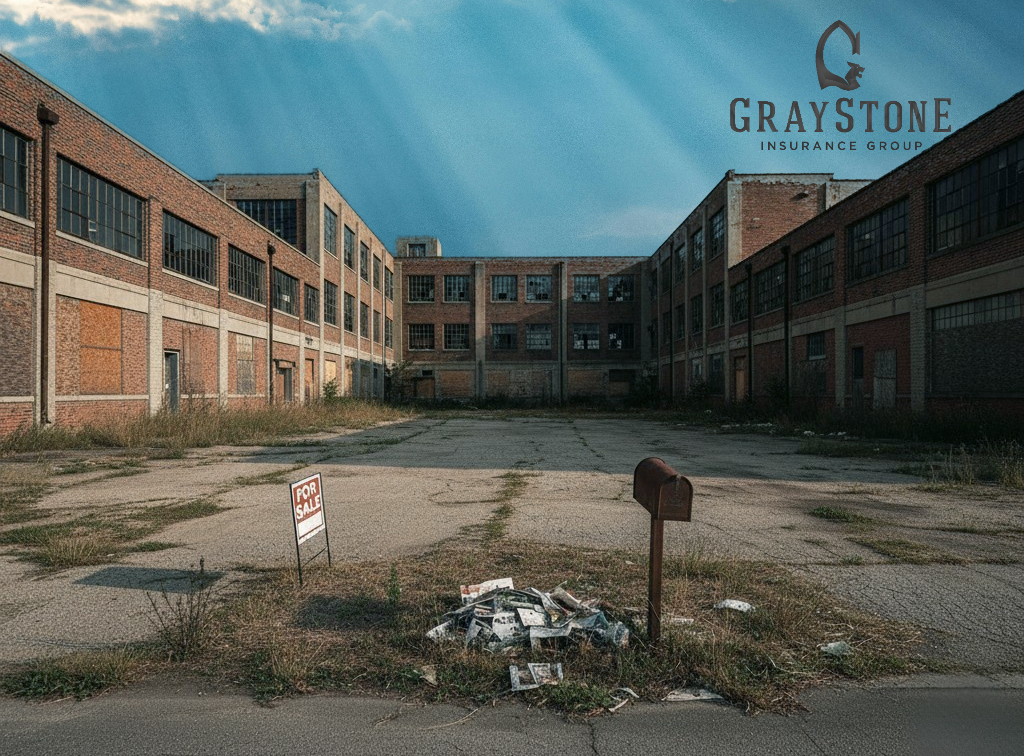
As a real estate investor, you’ve likely worked hard to buy a new property. But once it’s empty, something you might not have thought about becomes a big problem: insurance. You might think your regular insurance policy is enough, but it probably isn’t. Most standard policies have a rule that says if a property is empty for too long (usually 30 to 60 days), your coverage is no longer valid. This means that a small problem you don’t notice can become a huge, expensive disaster.
Standard insurance isn’t enough. Most regular insurance policies become invalid after a property has been empty for a short time, usually 30 to 60 days. This means your investment is unprotected.
Vacant properties face unique risks. Empty buildings are more likely to be targets for vandalism, theft, and squatters. Also, small maintenance problems like a leaky pipe can become huge disasters because no one is there to notice them.
Specialized insurance is essential. You need a specific vacant property insurance policy to protect your investment. This insurance covers risks that regular policies don’t, including damage to the building and liability claims if someone gets hurt on your empty property.
There are different policies for different needs. A vacant dwelling policy is for an empty house. A Builder’s Risk policy is a must-have if you’re doing major renovations.
You can lower your costs. The price of your insurance depends on things like the property’s location and security. You can help reduce your risk and your premium by securing the property and checking on it regularly
No. Most standard policies have a “vacancy clause” that cancels your coverage if the property is unoccupied for a period of time, usually 30 to 60 days.
An empty property is a higher risk because there’s nobody there to stop small problems from becoming big ones. For example, a small water leak could go unnoticed for weeks and cause a lot of damage.
A vacant dwelling policy is for a property that is empty but not being worked on. A builder’s risk policy is specifically for a property that is under construction or being heavily renovated.
Yes. Vacant property insurance can cover damage from vandals and thieves. It also includes liability coverage that protects you from lawsuits if someone gets hurt on your property, even if they weren’t supposed to be there.
You can often lower your premium by taking steps to reduce risk. This includes having a security system, regularly checking on the property, and making sure the outside is well-maintained.
Even if a property is only empty for a short time between renters, it’s still considered vacant. It’s a good idea to have vacant property insurance during this period to make sure your investment is protected.
Vacant property insurance isn’t just a nice thing to have; it’s a must-have. It’s a special type of insurance made to protect your investment from the unique dangers that an empty building faces. This guide will show you why regular policies don’t work, what risks you face, and how the right insurance can keep your money safe.
The Big Problem: Why Regular Insurance Doesn’t Work
To understand why you need specialty insurance, think about it from an insurance company’s point of view. A house with people living in it is a lot safer. The people living there can stop a small fire, notice a tiny water leak, or scare away a thief. This constant watchfulness makes the property less of a risk.
An empty building is the opposite. There’s nobody there to stop a break-in, turn off a faucet, or call the fire department. A small problem that would have been an easy fix in a home with people can become a total mess in an empty one. This is because nobody is around to see it for weeks or even months. This higher risk is why you need a different kind of insurance.
The Special Dangers of an Empty Property
An empty property can attract a lot of trouble that can cost you a lot of money.
What Vacant Property Insurance Covers
A special vacant property insurance policy is designed to combat these dangers. While you can customize the coverage, a good policy usually includes:
Different Policies for Different Investors
Not all empty properties are the same. A house that’s just waiting for a new renter is different from a property that is being completely renovated. Picking the right type of high risk insurance is very important.
What Affects the Cost of Your Insurance
The cost of your vacant property insurance depends on a few important things. Knowing these can help you save money.
Smart Ways to Protect Your Investment
While having the right insurance is your best protection, taking some extra steps can also lower your risk and even help you get a better price on your insurance.
Conclusion: Don’t Leave Your Investment Exposed
For real estate investors, an empty property is an opportunity, but it’s also a big, hidden risk. A regular insurance policy just isn’t made to protect an empty building from the special dangers it faces. By understanding these key differences and getting a special vacant property insurance policy, you can shield your investment from a financial disaster.
At GrayStone Insurance Group, we help real estate investors in places like Austin, Dallas, San Antonio, Houston, New York, Denver, and Tampa find the right coverage. Don’t leave your investment unprotected. Contact us today to schedule a consultation and get peace of mind.
This article has been a collaboration between GrayStone Insurance Group and AI research tools such as Gemini and ChatGPT. Created on Sep 25, 2025, it combines AI-generated draft material with GrayStone’s expert revision and oversight, ensuring professional expertise, accuracy and relevance while addressing any AI limitations.